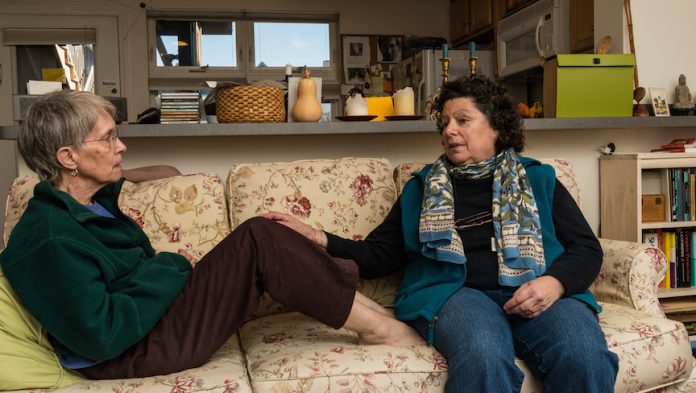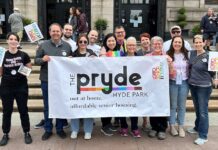
[Note: This column is running in the print version of the current March/April 2016 Boston Spirit magazine.]
Over the past four months, as a member of the LGBT Aging Project, I have had the opportunity to travel across the state of Massachusetts to co-facilitate a series of focus groups with LGBT older adults around their anticipated needs for housing. These focus groups are part of a collaborative research project between The LGBT Aging Project, The Fenway Institute and Simmons School of Social Work. For years, those involved in LGBT aging in this area have known that Massachusetts is a national leader in programing, service delivery, and training models but it is falling far behind in areas around LGBT senior housing.
Other cities like Chicago, Los Angeles, Philadelphia, San Francisco, and even Minneapolis, have developed stunning models of LGBT inclusive elder housing. One of the recommendations in The Massachusetts Commission on LGBT Aging’s formal report to the legislature was the development of such a project in The Bay State. The findings from these state-wide focus groups will help develop a needs assessment to gather critical information about income, housing, services, and other unmet needs for LGBT elders. This data would help the city and state move forward with the development of LGBT-friendly, affordable housing projects, catching Massachusetts up with similar housing trends across the country.
From discussions with diverse people from all corners of the state,it is clear that there isn’t one model that will serve every aspect of the Massachusetts’ community. It can be exciting to think about what kind of housing one would want when they approach those fabled “golden years.”
It may be easier to identify what one doesn’t want. Many certainly don’t want to end up in a nursing home or in an assisted living facility run by a staff who is not understanding or welcoming towards LGBT elders. Like many of the people the LGBT Aging Project has listened to across the state, Bay State elders may like to have the opportunity to age in place in their own homes. For, say, a single man, how long will that be possible once he reaches his 70s and 80s? The LGBT Aging Process is aware of the challenges many of our current LGBT seniors face who are living alone and trying to maintain their homes. The results are often isolating, burdensome, and cost prohibitive.
There is good news on the horizon. In addition to the Housing Recommendations from The Commission on LGBT Aging, there is also a small group of community members and professionals who have formed a special LGBT Senior Housing Task Force with the mission to get such a project under construction as soon as possible. There are a number of organizations who stand behind this work including the Department of Neighborhood Development and The Boston City Council. The difficult reality is that such a project could take years to complete. After listening to the participants in our focus groups as well as countless conversations from LGBT seniors at our programs and the LGBT senior meal sites it is clearly evident that there are many people who need a safe housing option now.
A Sharing Solution
Hope is not lost because there is a model that is more familiar, accessible and viable than one might think. It is what one might jokingly call “The Golden Girls” model. Let’s begin with a refresher for those who didn’t see the popular NBC show when it was running or for the younger generations who have not yet experienced it on HULU. “The Golden Girls” was a popular sitcom (1985–’92) about four single older women, three widowed and one divorcee, sharing a home in Miami. It was a stellar cast including Betty White, Bea Arthur, Rue McClannahan and Estelle Getty, who joined the women after escaping from unpleasant experiences at a retirement home.
Each of these women chose to live out their “Golden” years together in community instead of aging alone. For these women, this arrangement was a much better option than a traditional retirement home or living by themselves. Many of us, regardless of gender, can see ourselves growing into any one of those characters and enjoying that comradery.
Village (Model) People
So how does a Hollywood sitcom become a reality? This is actually a case where truth is better than fiction because we are seeing a model that is being perfected right here in Massachusetts that provides an even better solution than the one depicted in the sitcom. This is called the Village Model, which enables older adults, in whatever living arrangement they chose, to live in their own homes and receive services that will support them as they age. The home care element is what makes this an even better option than the arrangement Sophia and her housemates had because they would not have to be reliant on caregiving from each other.
This model has part of its roots in a movement that began here is Massachusetts with the Beacon Hill Village, a community based model that allows neighbors to share services and home care. The latest version based on this system is JP@Home, which is a member-driven program for Jamaica Plain residents who wish to age in place with social, educational, and in-home service supports. Although there are a growing number of such models across the country, JP@Home represents one that is LGBT friendly. Ethos, an elder service agency located in Jamaica Plain, has been the leader in Massachusetts for providing LGBT friendly services and programs. Now Ethos’ newest program JP@Home is another extension of that mission and they already have a number of LGBT seniors who are active participants.
If “The Golden Girls” were starting over today, they would be a part of JP@Home.
To contact the LGBT Aging Project, call 857-313-6578 or visit the website. To contact JP@Home, call 617-522-6700.








